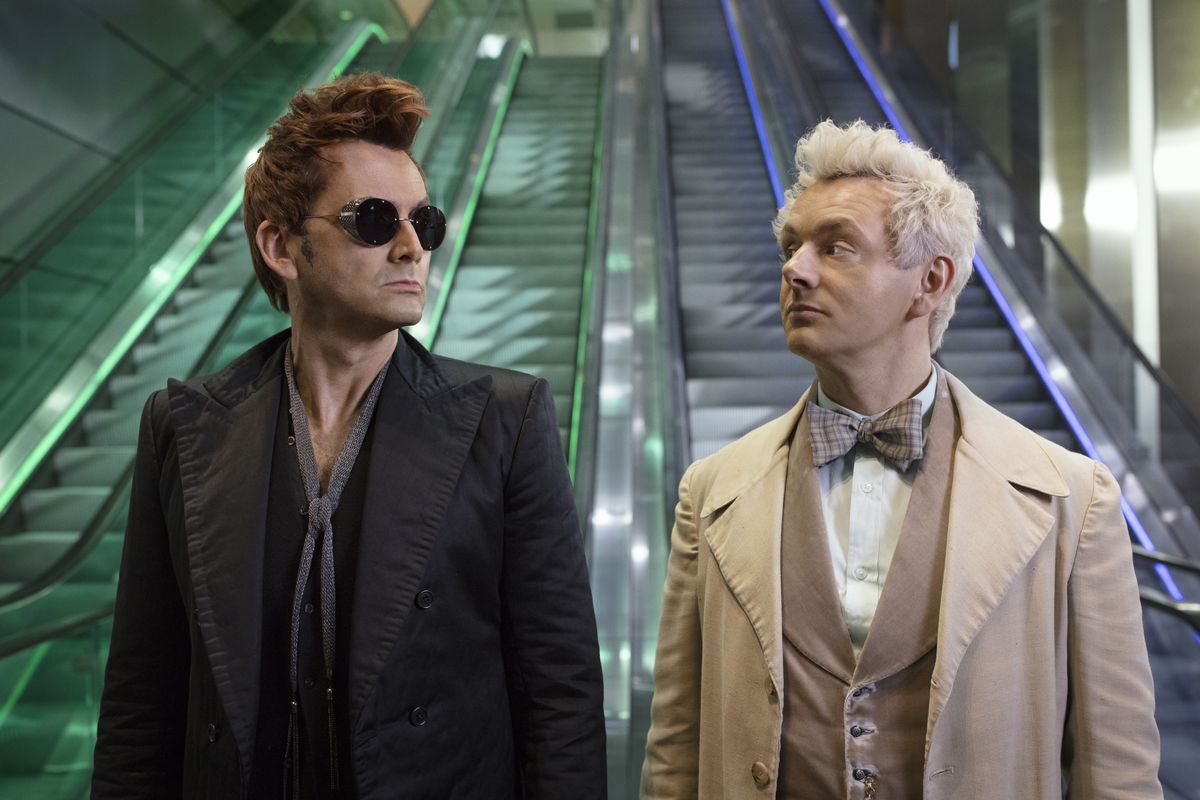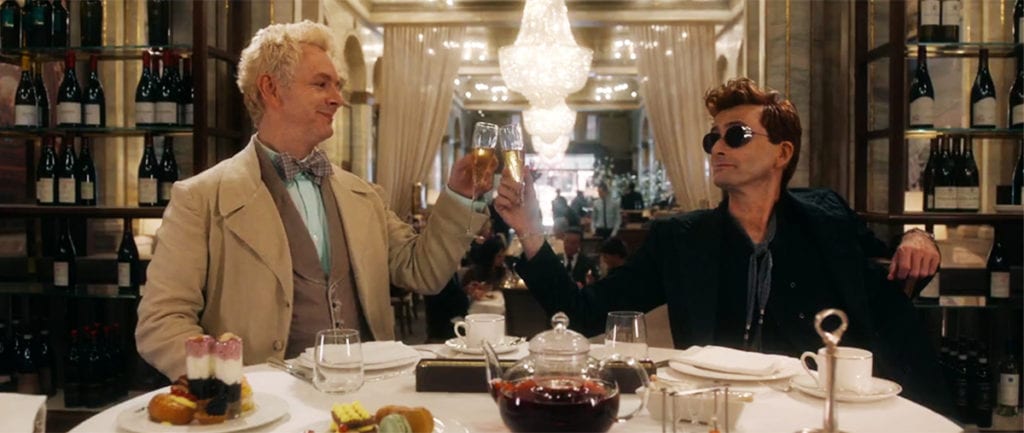
Good Omens is a 2019 Amazon Prime 6-episode series based on the book by Neil Gaiman and Terry Pratchett. It follows David Tennant as Crowley, a smooth-talking demon, and Michael Sheen as Aziraphale, a timid angel, as they join forces to try saving the earth from the impending Apocalypse. As the powers of Light and Darkness prepare for war, Crowley and Aziraphale must team up with an unlikely group of heroes to save the day; including a witch, a medium, witchfinders, and some kids.
Having grown up reading the Hitchhiker’s Guide to the Galaxy trilogy (all five of them), I was overjoyed to find that same absurdist whimsy applied to biblical theology. Good Omens is a collection of inside jokes, meandering philosophy, and voicemail messages loosely bound by the buddy comedy antics of Crowley and Aziraphale; the odd couple of the supernatural realm. It is a joy to read, as long as you don’t mind taking a long and winding road to reach your destination, because the meat of the book isn’t in the story. Good Omens is all about the footnotes.
Fun-Sized Tidbits
The footnotes in Good Omens are tiny nuggets of wisdom, humor, and absolute insanity. A footnote in Good Omens may be included to give background details, explain character traits, to make a quick joke, or simply to rant endlessly about any given topic, like so:
“Crowley upgraded [his computer] every few months because a sleek computer was the sort of thing Crowley felt that the sort of human he tried to be would have. This one was like a Porsche with a screen. The manuals were still in their transparent wrapping. *
* Along with the standard computer warranty agreement which said that if the machine 1) didn’t work, 2) didn’t do what the expensive advertisements said, 3) electrocuted the immediate neighborhood, 4) and in fact failed entirely to be inside the expensive box when you opened it, this was expressly, absolutely, implicitly and in no event the fault or responsibility of the manufacturer, that the purchaser should consider himself lucky to be allowed to give his money to the manufacturer, and that any attempts to treat what had just been paid for as the purchaser’s own property would result in the attentions of serious men with menacing briefcases and very thin watches. Crowley had been extremely impressed with the warranties offered by the computer industry, and had in fact sent a bundle Below to the department that drew up Immortal Soul agreements, with a yellow memo form attached just saying: ‘Learn, guys.’”
-Neil Gaiman & Terry Pratchett, Good Omens: The Nice and Accurate Prophecies of Agnes Nutter, Witch
These footnotes offer the reader glimpses into a vast and fascinating universe, a universe with rules made up on the fly and an internal logic resembling Alice’s Adventures in Wonderland. When reading the “information” offered up in the footnotes, the reader is sharply reminded that they are, in fact, reading a book, a book of fiction, a book so fictional that it’s nearly impossible to explain to one’s friends. This should take the reader out of the story. It should be frustrating to be constantly reminded that the book you are reading is nothing more than a flight of fancy. After all, we’ve been told by parents and teachers that books are serious things. Miraculously, these seemingly meaningless diversions do the opposite. Instead of pulling you out of the book, the footnotes pull you out of the real world. They invite you to let go of your preconceived notions about what a story is, to take a leap of faith, to let yourself be carried away by a current of creativity. Gaiman and Pratchett invite you to imagine the world as they see it.
“The only wall decoration was a framed drawing – the cartoon for the Mona Lisa, Leonardo da Vinci’s original sketch. Crowley had bought it from the artist one hot afternoon in Florence, and felt it superior to the final painting. *
* Leonardo had felt so too. ‘I got her bloody smile right in the roughs,’ he told Crowley, sipping cold wine in the lunchtime sun, ‘but it went all over the place when I painted it. Her husband had a few things to say about it when I delivered it, but, like I tell him […] who’s going to see it? Anyway, explain this helicopter thing again, will you?’”
-Neil Gaiman & Terry Pratchett, Good Omens: The Nice and Accurate Prophecies of Agnes Nutter, Witch
It’s very difficult to incorporate footnotes into a television show, and sadly, many of the jokes in Good Omens were sacrificed to the adaptation gods. The soul of the story, the silliness, and the heartfelt irreverence still remain.
In Episode 2 of Good Omens, we meet a young boy, Newton Pulsifer, a descendant of the great witchfinder Thou-Shalt-Not-Commit-Adultery Pulsifer. In the book, the setting for the scene is simple and effective:
“In a small house in Dorking, Surrey, a light was on in a bedroom window. Newton Pulsifer was twelve, and thin, and bespectacled, and he should have been in bed hours ago.”
-Neil Gaiman & Terry Pratchett, Good Omens: The Nice and Accurate Prophecies of Agnes Nutter, Witch
Here is how the Amazon Prime show handled the opening for the same exact scene:
This is what makes the Good Omens adaptation so great. When faced with the opportunity to do what was normal, the show runners, over and over again, chose to make a hard left into Crazy-town instead. This tiny moment, this stupid little fourth-wall breaking joke, gives the same feeling as reading the footnotes. It’s funny. In fact, it’s downright hilarious. More importantly so, it’s irreverent. This moment is about showing the audience that the emperor is not wearing any clothes.
Good Omens is a production with actors and producers and sets and cameras and dollies. It’s not afraid for you to know it. Most stories, whether they are told through television, film, or books, aim to make you forget that what you’re experiencing was a tireless labor of days, weeks, months, even years. Stories are supposed to be experienced in the moment, as if they are being improvised in real time. Good Omens, on the other hand, is confident enough to know that given the source material, the taboo of a fourth-wall break is a welcome treat.

If you haven’t had a chance to watch Good Omens on Amazon Prime, please do check it out. The writing is absurdly good, the costumes and sets are awe-inspiring, and the casting is perfect. David Tennant and Michael Sheen have some of the most palpable chemistry I’ve ever seen on screen. If you like angels and demons, witches and the men who love them, and stories that give you the hope you need to get through the day, Good Omens is for you.
If you find that you like the show, please consider reading the book. The late, great Terry Pratchett was a true comedic genius, and Good Omens is a testament to the whimsical optimism he brought with him on every project. Neil Gaiman has said that he made the series Good Omens to honor Terry Pratchett’s memory, and I am certain that Pratchett would be honored indeed.



Recent Comments